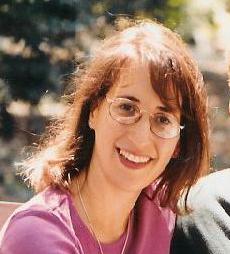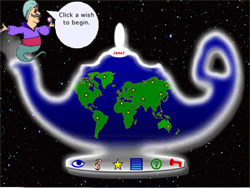Publications
| Professional | Courses | Media
| Education | Vita
|
Publications/Papers
Zydney, J. M. (in press). Role-playing the web. Leading & Learning with Technology.
Zydney, J. M. (2005). Bringing the web to life: A learning game for children with diverse learning needs. Unpublished manuscript, University of Kentucky.
Zydney, J. M (2005). Eighth-grade students defining complex problems: The effectiveness of scaffolding in a multimedia program. Journal of Educational Multimedia and Hypermedia, 14(1), 61-90.
Zydney, J. M, (2005, April). Deepening our understanding through multiple perspectives: The effectiveness of scaffolding in a learning environment. Paper presented at the annual meeting of the American Educational Research Association, Montreal, Canada.
Roberts, M. & Zydney, J. M. (2004). Students as environmental consultants: Simulating life science problems. Learning & Leading with Technology, 32(1), 22-25.
Zydney, J. M. & Holovach, R. (2004). What happens when teachers collaboratively look at student work? Science Scope, 27(5), 20-22.
Zydney, J. M. (2004). The effect of different types of scaffolding in a multimedia program on students' problem finding. Doctoral dissertation, New York University, New York. (UMI No. 3124970).
Zydney, J. M. (2004, February). Students defining complex problems through questioning: The effectiveness of scaffolding in a multimedia program. Paper presented at the annual meeting of the Eastern Educational Research Association, Clearwater, FL.
Zydney, J. M. (2003, February). The effect of different types of scaffolding on students' ability to define complex problems: A pilot study. Paper presented at the annual meeting of the Eastern Educational Research Association, Hilton Head, SC.
Zydney, J. M. (2003). Scaffolded Flexibility Model. Unpublished manuscript, New York University.
return to top
Professional Experience
UNIVERSITY OF KENTUCKY, Lexington, KY
Post-Doctoral Fellow in Special Education Technology, 2004-2006
Selected for a post-doctoral fellowship with Dr. Ted S. Hasselbring. Developed a research agenda around the use of instructional scaffolding to help students with learning disabilities. Pursued grant funding to support research. Designed a software prototype to assess proof of concept. Wrote manuscripts for publication, and presented papers at conferences.
NEW YORK UNIVERSITY, New York, NY
Adjunct Professor in The Steinhardt School of Education, 2004
Redesigned and taught a graduate course, which provided educators with lesson plans and activities for integrating technology into the classroom, strategies for overcoming obstacles to integration, and methods of assessing technology projects. Created a course syllabus and selected readings and media resources for the course. Facilitated small group discussions and activities related to readings and engaged students in experiential, hands-on lessons that demonstrated a variety of approaches for technology integration. Moderated online discussions about thought-provoking media.
Research Assistant at the Professional Development Laboratory 2000 - 2003
Conducted focus groups and interviews to evaluate the effectiveness of the Schools Around the World project, an online professional development course for math and science teachers about assessment and standards. Taught technology seminars for educators. Collaboratively wrote grant proposals and reports for funders and the advisory council. Maintained the web site and conducted usability tests of the new design.
JOHNS HOPKINS UNIVERSITY, Baltimore, MD
Online Course Developer for the Center for Technology in Education, 2003 - 2004
Developed an online course for science teachers about using new media and technology to promote critical thinking and how to use electronic portfolios as a means for assessment. Course included a variety of online communication methods, community bulding activities to foster a collaborative learning environment, meaningful assignments to provide teachers with real applications of the concepts covered, and strategies for accommodating diverse learners.
RUTGERS UNIVERSITY, New Brunswick, NJ
Adjunct Instructor for the Writing Program, 2003 - 2004
Taught an undergraduate course about writing to communicate across different disciplines and to think critically about issues from multiple perspectives. Extensively utilized a web forum to promote class discussion. Incorporated online resources into the readings to help students apply their ideas to a broader context. Maintained a class page to provide students with reminders, assignments, and other helpful resources.
MEDIA WORKSHOP, a project of the Berlesmann Foundation, New York, NY
Technology and Media Education Consultant for NY Public Schools, 2000 - 2004
Provided technology staff development to schools. Co-taught with teachers in their classrooms in order to model ways to integrate media and technology into the curriculum. Taught middle school and high school students how to develop multimedia projects during after-school workshops and summer institutes. Designed and taught a summer institute for educators about the key issues affecting the successful integration of technology into the public schools. Participated on a collaborative grant writing team. Co-led the redesign of the web site and managed a team to develop a searchable online database of technology-integration projects.
Return
to top
Courses
EDS 712 SEMINAR IN SPECIAL EDUCATION PROFESSIONAL SERVICES: PROPOSAL DEVELOPMENT
This course is designed for the advanced doctoral student who is preparing for a leadership position in special education. EDS 712 is designed to assist special educators in the proposal writing process, both research and personnel preparation. In addition, this course prepares students to engage in professional services such as consultation and proposal preparation.
Fall 2005, Mondays, 4:30pm - 7:00pm
EDS 645 HYPERMEDIA DEVELOPMENT FOR SPECIAL EDUCATION
Students will study ways that hypermedia/multimedia can be developed for use in special education programs. Students will examine how principles of human learning and universal design provide a foundation for designing instructional programs that meet the unique needs of all students. Topics will include theories of human learning, principles of universal design, hypermedia/multimedia concepts, interface design guidelines, computer graphics programs, digital scanning of images, accessible text, sound effects, use of digital movies, and multimedia authoring tools. Prereq: EDS 514 and EDS 600, or permission of instructor.
Spring 2006, Wednesdays, 4:30pm - 7:00 pm
return to top
Media Projects
Software Programs
Mad Math Adventures is a prototype of an intervention to help students achieve proficiency in mathematics. This multimedia program will help children achieve their goals in understanding mathematics through their quest to discover the mathematical connections to the world around them. For each topic, students will pursue a new adventure that includes realistic math problems presented through digital video clips. The difficulty level of these problems will be adjusted to provide the appropriate level of challenge for each individual student.
|
|
 |
Pollution Solution is an interactive multimedia CD that enables middle school and high school students to learn critical problem-solving skills in the context of studying our environment. Through the use of the Pollution Solution software, the classroom is transformed into an environmental consulting firm. The students became interns for a fictitious firm and are given a client, a utility company, who had just been sued for violating the Clean Air Act. In this scenario, the teacher plays the role of an internship supervisor in order to assist the interns in defining and eventually recommending solutions to their client.
|
Web Publications
My Pollution Solution
http://edsrc.uky.edu/people/jzydn2/PollutionSolution/
This web site was developed to describe my dissertation research. It is a companion web site to the Pollution Solution software and enables other teachers the opportunity to do similar projects in their classrooms.
Media Workshop New York*
http://www.mediaworkshop.org/
This web site was designed to showcase Media Workshop's services and provide professional development resources for educators.
Professional Development Laboratory*
http://www.nyu.edu/pdl/
This web site was designed to highlight the Professional Development Laboratory's programs and offerings for educators.
It's Story Time
http://pages.nyu.edu/~jlz204/storytime.html
An interactive web site for elementary students that allows them to create their own stories.
Videos
Who’s Next?*
A 12-minute documentary about discriminatory violence.
A Paper Craze*
A 10-minute educational video about recycling for elementary-aged students.
*indicates that these publications were authored by a collaborative team
return
to top
Education
NEW YORK UNIVERSITY, New York, NY, 2000 - 2004
Doctorate of Philosophy in Educational Communication and Technology, GPA 4.0/4.0
Dissertation Topic: The effect of scaffolding on students' problem finding
Advisor: Dr. Jan L. Plass
NEW YORK UNIVERSITY, New York, NY, 1998 - 2000
Master of Arts in Educational Communication and Technology GPA 4.0/4.0
WASHINGTON UNIVERSITY, St. Louis, MO, 1988 - 1993
Bachelor of Science in Chemical Engineering, Minor in Psychology, GPA 3.3/4.0
Academic Scholarship,
Dean’s List
return to top
Copyright © 2005. Zydney. Last updated August 15, 2005
|



